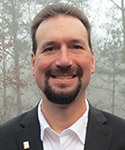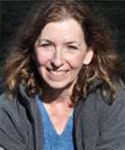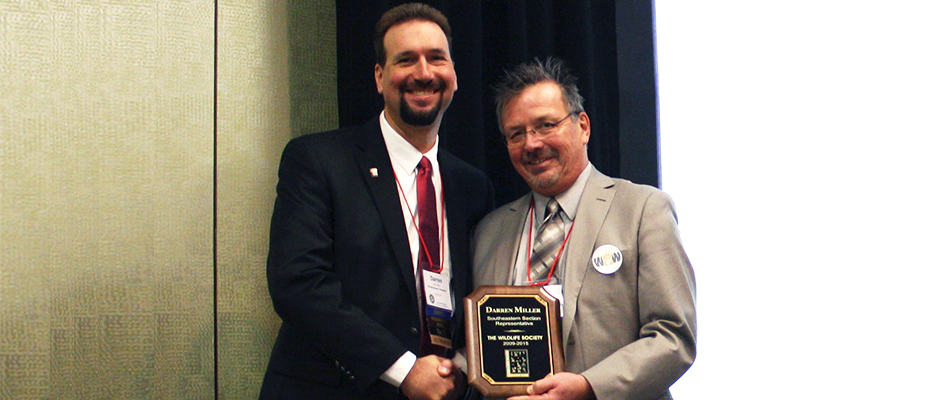Share this article
2016 TWS Council election results: Meet the new members
The results from the 2016 TWS Council elections are in. The Society has elected Darren A. Miller, of the Southeastern Section and former representative to Council, as the next vice president of TWS. John J. Moriarty, past president of both the Minnesota Chapter and North Central Section, will join Council for the first time as the North Central Section representative. Cynthia Graves Perrine and Harriet Allen, of the Western and Northwest Sections, respectively, have each been re-elected to serve their second term as Council representatives. TWS extends their thanks to all of the candidates who ran for office, including Gordon Batchellor, Kent Smith, Dana Sanchez and Patrick Lederle.
The aforementioned election winners will begin their term during the Members Meeting at the 23rd Annual Conference this October in Raleigh, North Carolina. Meet your new Council members!
This year’s election ballots also included three proposed bylaws changes. Results of those votes to come next week on wildlife.org. Stay tuned!
Darren Anthony Miller
Vice President
 “My vision for the Wildlife Society (TWS) is to be THE professional wildlife organization for students, wildlife biologists and the citizens. I desire for The Wildlife Society to be the primary source of science-based information regarding management of our wildlife resources. To accomplish this, we must be sure that TWS serves member needs and stands as a unified voice for science-based wildlife management. This vision requires that we (1) have the financial and human resources to accomplish our mission; (2) strengthen relationships among sections, chapters and the parent society; (3) address conservation issues by adhering to and promoting science-based decision-making; (4) remain mindful of our core values; (5) recognize the key role of existing partnerships and develop new partnerships; (6) continually provide tools and services to our members; (6) expand our policy program to better address loca1, regional, national and international issues; and (7) fully recognize the value of every TWS member and understand that, as a volunteer-based organization, we are only as strong as our membership which must reflect the human diversity of our profession and of society.
“My vision for the Wildlife Society (TWS) is to be THE professional wildlife organization for students, wildlife biologists and the citizens. I desire for The Wildlife Society to be the primary source of science-based information regarding management of our wildlife resources. To accomplish this, we must be sure that TWS serves member needs and stands as a unified voice for science-based wildlife management. This vision requires that we (1) have the financial and human resources to accomplish our mission; (2) strengthen relationships among sections, chapters and the parent society; (3) address conservation issues by adhering to and promoting science-based decision-making; (4) remain mindful of our core values; (5) recognize the key role of existing partnerships and develop new partnerships; (6) continually provide tools and services to our members; (6) expand our policy program to better address loca1, regional, national and international issues; and (7) fully recognize the value of every TWS member and understand that, as a volunteer-based organization, we are only as strong as our membership which must reflect the human diversity of our profession and of society.
I have been a TWS member since 1990 and have remained actively engaged in TWS at all levels of the organization, allowing me to have a broad perspective on how to serve our membership and strengthen our Professional Society. Additionally, I have worked in the research, policy and applied management arenas with a diverse constituency of natural resource professionals across state and federal agencies, universities and nongovernmental organizations. I will use these experiences to effectively engage TWS with compatible natural resource organizations and ensure that our collective expe1tise is used and voice heard for critical conservation decisions. As a member of the TWS Leadership Team, and as President, it will be my top priority that our Society continues to grow, is welcoming to biologists of all backgrounds, provides new and relevant membership services, and is a prominent, trusted voice in wildlife conservation.
John J. Moriarty
North Central Section Representative
 TWS has been a very important part of my career. I am the past president of the Minnesota Chapter and the North Central Section. The opportunity to serve as the North Central Representative to council will allow me to contribute to TWS development of a stronger membership base and have greater influence in wildlife conservation.
TWS has been a very important part of my career. I am the past president of the Minnesota Chapter and the North Central Section. The opportunity to serve as the North Central Representative to council will allow me to contribute to TWS development of a stronger membership base and have greater influence in wildlife conservation.
TWS is the leading scientific organization dealing with wildlife management, biology and policy. We have been working on these issues for over 75 years. Unfortunately, we are not seen as the go-to organization for the public or elected officials. The TWS chapters, sections, national staff and board do excellent work on providing important information to policy makers and nonprofit advocacy groups. We, the TWS membership, need to get that information out to a broader public audience. This can be done by a stronger collaboration between the National Office, Sections and State Chapters. I would like to work on making the connections even stronger so that every wildlife professional understands the importance of TWS.
Another important area is the inclusion of all wildlife in TWS activities, conferences, journals and policies. Emphasis of our traditional wildlife species should not be diminished, but the greater inclusion of invertebrates, reptiles, amphibians and other taxa should be embraced as an important part of TWS. This will provide us a wider membership by attracting members who had previously not considered TWS as an appropriate professional society for their taxa. This increased membership will provide a stronger voice in habitat and ecosystem protection.
Harriet Allen
Northwest Section Representative
 I view The Wildlife Society as THE organization for wildlife professionals that are “leaders in wildlife science, management and conservation,” as seen in our name and logo on the TWS website. I think TWS and its wildlife professional members are respected for being able to provide the sound science needed to make wildlife management decisions. In my three years as Northwest Section Representative I have seen how dynamic and invigorated TWS is, with an incredibly capable, dedicated and motivated headquarters staff, and the significant role that Representatives to Council play in decision-making for TWS.
I view The Wildlife Society as THE organization for wildlife professionals that are “leaders in wildlife science, management and conservation,” as seen in our name and logo on the TWS website. I think TWS and its wildlife professional members are respected for being able to provide the sound science needed to make wildlife management decisions. In my three years as Northwest Section Representative I have seen how dynamic and invigorated TWS is, with an incredibly capable, dedicated and motivated headquarters staff, and the significant role that Representatives to Council play in decision-making for TWS.
In the next three years, I envision TWS, the Council and members working to:
- continue the building and monitoring of a sound TWS financial structure;
- determine the best strategies for Society publications into the future;
- increase TWS partnerships at many levels;
- increase and retain members by providing the best benefits and values to members;
- ensure strong policy influence and support for TWS positions and issues of concern;
- recruit, train and retain a new generation of leaders of TWS and the profession;
- increase diversity in TWS and the profession;
- provide great support to chapters and sections; and
- to be recognized as the strong, scientifically-based organization for wildlife professionals.
It has been an honor to serve as the Northwest Section Representative to TWS Council the last three years. If elected, I would work hard to continue to bring perspectives from the Alaska, Idaho, Montana, Oregon and Washington Chapters of the Northwest Section to the Council discussions and decision-making.
Cynthia Graves Perrine
Western Section Representative
 In the past two and a half years that I’ve served on Council, TWS has set strategic plan objectives and made good progress toward achieving them. Accounting methods are aligned with nonprofit best management practices, and there is more oversight from Council. Member services have increased, and membership decline is slowing. Annual Meetings have provided good networking and professional development opportunities. Yet, we have room for improvement. If elected, I’d continue to advocate for Western Section, and for the interests of TWS members at all levels, across all organizational units — sections, chapters and student chapters.
In the past two and a half years that I’ve served on Council, TWS has set strategic plan objectives and made good progress toward achieving them. Accounting methods are aligned with nonprofit best management practices, and there is more oversight from Council. Member services have increased, and membership decline is slowing. Annual Meetings have provided good networking and professional development opportunities. Yet, we have room for improvement. If elected, I’d continue to advocate for Western Section, and for the interests of TWS members at all levels, across all organizational units — sections, chapters and student chapters.
TWS must be mindful of our heritage, yet remain relevant within our profession. To support a member-minded mission requires financial stability, and I’d continue encouragement of staff to secure suitable financial supplies from outside our organization. Listening to members, identifying strengths and ideas of sections and chapters, and sharing successful methods across all organizational units should be a component of all operations.
Members at all levels — students, professionals and retirees — can devote a variety of contributions to their professional society. TWS should leverage talents, ideas, service and experience of members. I believe in applying creative solutions, and in Council advising staff to set program objectives.
I will continue to call for TWS’ support of emerging wildlife professionals, and to provide outreach to underrepresented and undersupplied prospective members. Western Section will continue to develop and test programs that may serve as a model for The Wildlife Society and other organizational units.
Header Image: Darren Miller (left) was recognized last fall in Winnipeg upon completion of two consecutive terms as the Southeastern Section representative to Council. This year in Raleigh, he will begin his term as TWS vice president.








